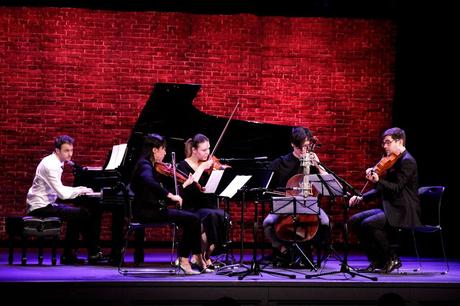
Five alive: Gregg Kallor (left) and the Attacca Quartet in concert at the Sheen Center.
Photo by Andrew Ousley.
The concert opened with Mr. Kallor alone at the piano, playing Notes from Underground, a three part suite inspired by the nearby venue SubCulture. This work offers the composer’s signature sound: quirky codes, jazz modes and sharp-tongued melodies that tease and please the ear as the move in and out of focus, Mr. Kallor’s nimble fingers drove the work along, taking this tuner on the twists and turns of his musical imagination.
The slow central movement, (”Ballerina Gone Bad”) owed something to Kind of Blue-era Miles, with its delicately shaded, impressionist chords contrasting with glitter I g fragments of melody. The work wrapped with The Good Kind of Crazy”, with skipping dance rhythms and constant, shifting colors reflecting the colorful crew that succeeded in making SubCulture a key part of this city's musical fabric.
The pianist yielded the stage to the Attacca Quartet, an exceptional young ensemble that has that most important quality in. String quartet: it's own distinctive sound and tone. They applied these gifts to the first movement of Mendelsssohn’s String Quartet No. 2, a slow-fast movement that dazzles with the complexity of its construction. All the wit and rigorous musical logic of this compos r were heard here in full flight, an excellent argument for this ensemble to turn its energies to the performance and promotion of Mendelssohn’s chamber music.
Some Not Too Distant Tomorrow was commissioned by the Classical Recording Foundation and reflect’s the lifelong fascination that Mr. Kallor has had for Dr. King. The work is an effort to provide a musical accounting of the civil rights leader's incarceration in Birmingham Alaba,am, am incident that led to the writing of the Letter from Birmingham City Jail on April 16, 1963. It incorporates modern melodic and jazz ideas in a flawless fusion of sounds, reflecting no the tension, unease and tragedy of Dr. King's too-brief life.
The work uses piano and string quartet in effective tandem, generating fresh voicings as the instruments are sounded, combined and recombined. The five movements are pure music,with some room for Mr. Kallor’s piano to improvise against the ensemble. There is a stunning fast movement where fast pizzicato work dives and leaps over a keening violin and Mr, Kallors steady pianism. The slow final movement was the best of all. Here, slow, hypnotic chords and gentle string melodies forged a gentle, hopeful cloak of sound, a light and transparent comfort in these dark times.
Mr. Kallor and the Attacca Quartet had one more offering: his instrumental reworking of “Layla”, the Eric Clapton tune that the English guitar hero original pay released under the alias of Derek and the Dominoes. The song is in two sections, a keening, hear trending opening with the first violin wailing away like Claptons guitar, and a slow, transcendent finale, mined as a source of variations and improvisation by Mr. Kallor's endlessly inventive fingers.

